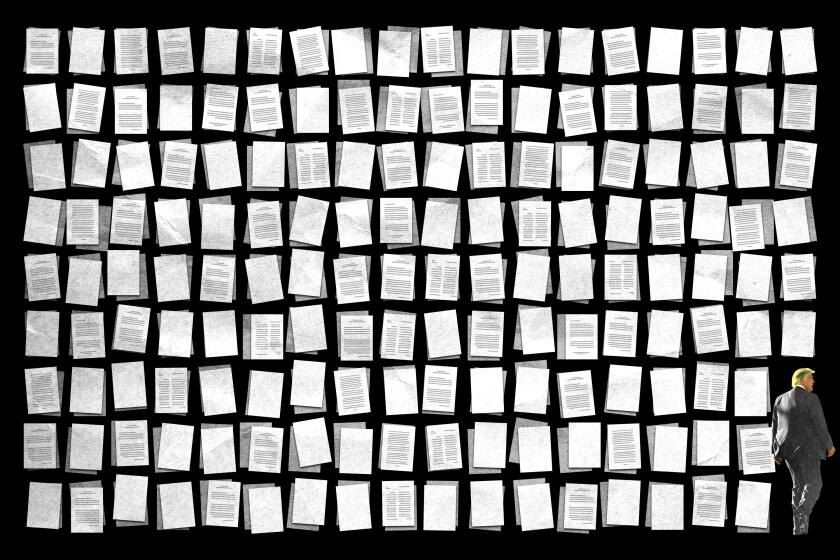Appeals court panel skeptical of Trump’s arguments in Mar-a-Lago special master case

- Share via
WASHINGTON — A three-judge panel appeared skeptical Tuesday of a lower court judge’s decision to appoint a special master to review materials seized from former President Trump’s Mar-a-Lago estate and block the Justice Department from using those materials as part of its investigation.
During brief arguments before the 11th Circuit Court of Appeals in Atlanta on Tuesday, the three judges questioned whether U.S. District Judge Aileen Cannon had jurisdiction to appoint a special master. They also expressed concern about allowing courts to limit investigators’ access to documents before any indictments have been made.
The Justice Department wants the panel to overturn Cannon’s decision to appoint a special master, or independent arbiter, to review more than 22,000 records seized by the FBI during a court-approved Aug. 8 search of Trump’s Florida property. It also wants the court to overturn Cannon’s decision to block investigators from accessing the documents until the months-long process ends.
The 11th Circuit panel of Chief Judge William Pryor, Judge Britt Grant and Judge Andrew Brasher heard the appeal.
All three judges were appointed by Republicans. Pryor was appointed by former President George W. Bush. Grant and Brasher were appointed by Trump.
Grant and Brasher were on a panel that ruled for the Justice Department and against Trump in September. In that decision, they blocked part of Cannon’s order that had included about 100 seized classified documents in the special master’s review and had prohibited investigators from accessing those documents during that review. The Supreme Court declined to weigh in.
Much of the reasoning the 11th Circuit used in that decision applies to the broader appeal.
Federal prosecutors have argued that Trump’s case never fulfilled the requirements for appointing a special master. The usual standard in such cases would have required Trump to prove that the government showed a “callous disregard” for his rights in executing the court-approved search of the property.
In her order, Cannon acknowledged that Trump could not meet that burden, but ruled that the case met the other requirements for appointing a special master. Prosecutors said those other requirements should-n’t have been considered if the callous-disregard standard was not met.
Questions asked by the judges indicated they agreed.
Pryor asked Trump’s lawyer to cite “a single decision by a federal court other than this one” with a similar result.
Trump’s lawyer Jim Trusty said that he could not, but that the circumstances of a former president being the subject of the search needed to be considered.
“I agree with the court’s premise that there’s not case law,” Trusty said. “I would start with the broader premise, which is there’s also not a situation in the history of this country where a sitting president authorized a raid of a presidential candidate’s home.” Trusty also said that his team isn’t asking for special treatment for Trump.
Despite Trusty’s comments in court, President Biden did not authorize a raid of a presidential candidate’s home. The Justice Department obtained the Mar-a-Lago search warrant by presenting an affidavit to a magistrate judge who ruled that it had enough evidence of a possible crime to justify a search. Trump had not announced his plans to run for election at that time.
White House officials have said that Biden did not have advance notice of the search warrant application or the search itself.
Pryor and the other judges questioned the idea that Trump’s former job or future presidential ambitions should affect their decision.
“Basically, other than the fact that this involves a former president, everything else about this is indistinguishable from any pre-indictment search warrant, and we’ve got to be concerned about the precedent that we would create that would allow any target of a federal criminal investigation to go into a district court and to have a district court entertain this kind of petition ... and interfere with the executive branch’s ongoing investigation,” Pryor said.
The review of thousands of pages of documents by special master Raymond Dearie, a senior judge of the U.S. District Court for the Eastern District of New York, continues, and court filings show that Trump has largely discarded his prior claims of executive or attorney-client privilege over the documents. Trump asserted executive privilege over about 120 out of 2,916 documents, and then largely only if the special master does not determine they are personal records. He claims that the other records are personal records under the Presidential Records Act.
The act gives the National Archives and Records Administration control over all records created for or used by the president or his staff while in office. Personal records are loosely defined in the law but have generally included medical records, personal diaries, children’s report cards and other such items.
Trusty told the court that Dearie’s review of the documents should be over by mid-December and that Cannon could make a ruling by the first of the year.
But prosecutor Sopan Joshi said resolution won’t be that quick, with litigation and appeals about the special master’s decision expected to take several more months.
“Delay is fatal to vindication of the criminal process,” he said.
Congress wants initial answers about what is missing by next week. Archivist experts say that’s not realistic.
Federal prosecutors also argued that Cannon’s order preventing them from using the unclassified documents in their investigation for the last three months has prevented them from using unclassified records commingled with records bearing classification markings. For example, they’ve been unable to piece together timelines related to when these materials might have been compiled or accessed, or to question witnesses who may be familiar with these documents’ contents.
Trusty complained in the argument that the arbiter’s review is necessary to prove that the FBI’s search warrant was overly broad. He said the seized items included golf shirts, birthday cards, newspaper clippings and a photo of musician Celine Dion, and included items from before and after Trump’s term of office.
Pryor noted that the warrant instructed federal agents to recover classified materials along with other items that were stored nearby or in the same containers.
“The search warrant was for classified documents and boxes, and other items that are intermingled with that. I don’t think it’s necessarily the fault of the government if someone has intermingled classified documents and all kinds of other personal property,” Pryor said.
More to Read
Get the L.A. Times Politics newsletter
Deeply reported insights into legislation, politics and policy from Sacramento, Washington and beyond. In your inbox twice per week.
You may occasionally receive promotional content from the Los Angeles Times.












